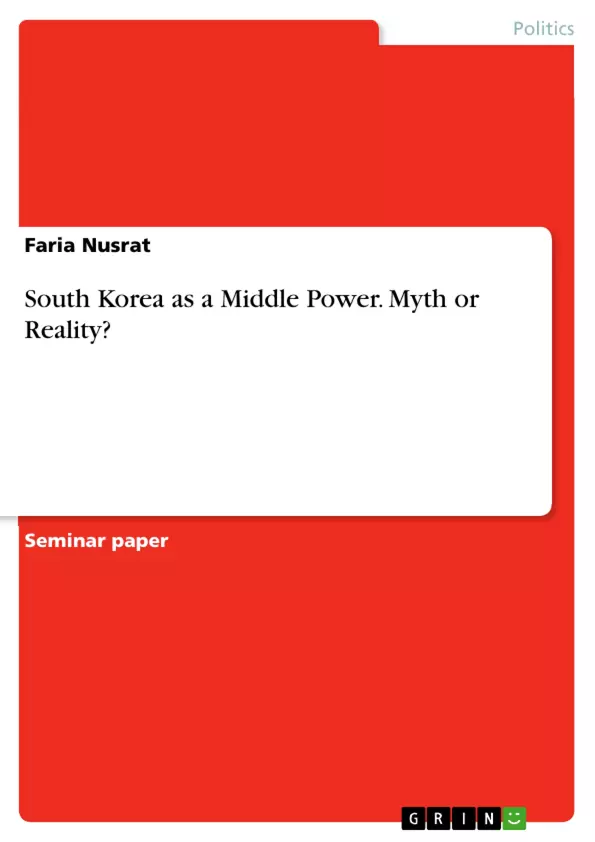This paper answers the question how South Korea’s possession of “middle power” status should be evaluated. The paper answers this question and shows how South Korea can be considered as emerging Middle Power.
Middle Power Countries should be middle position in the terms of military capability, Population, economy. Geographical Location and quality of Diplomacy in order to maintain global world and they offer solution in international problems. South Korean is the first non G7 and non western country who led the G20 leader’s summit in 2010. In the survey of 2018 showed that South Korea has 12th largest GDP among 205 countries. South Korea’s military power also holds top 10 ranked in the world. The world’s ninth-largest trading country with more than 60 percent of its domestic economy dependent on trade ranking it sixth in the world. Though some researchers are believe that its state Affairs has not matched its middle power status.
Inhaltsverzeichnis (Table of Contents)
- Abstract
- Introduction
- Research Question and Methodology
- Literature Review
- Analysis
- Define Middle Power
- South Korea Middle Power Activism
- South Korea :Emerging Middle Power
- Conclusion
- Reference
Zielsetzung und Themenschwerpunkte (Objectives and Key Themes)
This paper aims to assess South Korea's status as a middle power by analyzing its economic, military, and diplomatic capabilities. It examines the factors that contribute to South Korea's middle power status, such as its robust economy, strong military, and active participation in global affairs. It also explores potential limitations in South Korea's pursuit of middle power status.
- South Korea's Middle Power Status
- South Korea's Economic, Military, and Diplomatic Capabilities
- South Korea's Role in Global Affairs
- Limitations of South Korea's Middle Power Aspirations
- South Korea's Relationship with the United States
Zusammenfassung der Kapitel (Chapter Summaries)
- Abstract: The abstract outlines the paper's central research question and provides a brief overview of South Korea's economic, military, and diplomatic capabilities. It also highlights the debate surrounding South Korea's claim to middle power status.
- Introduction: The introduction provides context for South Korea's role in global affairs, emphasizing its active participation in regional and multilateral diplomacy. It highlights South Korea's economic and military power, while also acknowledging the debate about its actual middle power status.
- Research Question and Methodology: This section clearly defines the research question, which is how South Korea's possession of "middle power" status should be evaluated. The methodology is described as a descriptive and analytical approach using secondary sources such as books, journals, and previous research.
- Literature Review: This section reviews two articles that address South Korea's middle power status. The first article by Dr Cha Vicror D and Marie Dumond argues that South Korea is a successful middle power, while also highlighting its limitations. The second article by Sarah Teo, Bhubhindar Singh, and See Seng Tan argues that South Korea fulfills the criteria of a middle power based on its economic capabilities, military strength, and active participation in multilateral forums.
Schlüsselwörter (Keywords)
The paper focuses on South Korea's emerging middle power status, examining its economic, military, and diplomatic capabilities in relation to its role in international affairs. Key themes include middle power diplomacy, South Korea's economic and military strength, its engagement in global affairs, and its relationship with the United States. The paper also explores the limitations of South Korea's middle power aspirations.
Frequently Asked Questions
Is South Korea considered a middle power?
Yes, South Korea is increasingly recognized as an emerging middle power due to its significant economic size, military strength, and active role in international diplomacy.
What are the criteria for a middle power country?
Middle powers typically hold a middle position in terms of military capability, population, and economy, and they often lead in solving international problems through diplomacy.
How large is South Korea's economy globally?
As of 2018, South Korea had the 12th largest GDP in the world and is the 9th largest trading nation, with a heavy dependence on international trade.
What role did South Korea play in the G20?
South Korea was the first non-G7 and non-Western country to host and lead the G20 leader's summit in 2010, marking a milestone in its middle power diplomacy.
What are the limitations of South Korea's middle power status?
Some researchers argue that South Korea's state affairs and regional constraints sometimes do not fully match its global middle power aspirations or capabilities.
- Quote paper
- Faria Nusrat (Author), 2019, South Korea as a Middle Power. Myth or Reality?, Munich, GRIN Verlag, https://www.grin.com/document/937783



